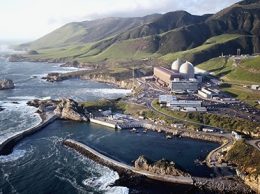Lands commission sued over lease extensions for Diablo Canyon Power Plant
The World Business Academy, a Santa Barbara non-profit think tank that lobbies for renewable energy use, sued the California State Lands Commission on Aug. 2 in state court in Los Angeles over the approval of temporary land lease extensions at the Diablo Canyon Power Plant.
On June 28, the lands commission granted Diablo Canyon owner and operator Pacific Gas & Electric temporary land lease extensions until the plant’s operational permits expire in 2025. One 49-year lease issued in 1969 would have expired on Aug. 17, 2018. Another 49-year lease would have expired May 31, 2019.
On June 21, PG&E announced plans to close the Diablo Canyon Power Plant on Avila Beach’s coast after those permits expire in 2025 and replace the plant with renewable energy sources. Before the lands commission’s meeting June 28, a staff report recommended temporary approval of the land permits.
At the time, the extensions were for water intake structures and breakwaters at the plant used to pipe cooling water through the plant’s nuclear reactors. They were approved with the condition that the plant will not apply to have other permits renewed past 2025.
In the lawsuit, the group says the commission errored when it granted PG&E an extension without conducting an environmental review of the impacts on sea life near the water intake and outfall structures.
The commission said it did not need to conduct an additional environmental review because an environmental review already took place when the land permits were granted in 1969 and 1970.
“The language quoted from the commission’s staff report is legally and factually in error,” the lawsuit says. “An agency may not apply a categorical exemption without considering the evidence in its files of potentially significant effects; regardless of whether that evidence comes from its own investigation, the proponent’s submission, a project opponent, or some other source.”
In a statement to the Business Times, PG&E spokesman Blair Jones said approval of the lease extension was an important milestone in the joint proposal PG&E crafted with environmental groups and labor unions to close the plant by 2025.
“In its June decision, the State Lands Commission granted the lease extension as it determined there were no CEQA issues associated with PG&E’s application,” Jones said. “This is because the intake and outfall structures were currently operating under approved leases, and PG&E proposed no new operational or design changes.”
Water discharged from the plant returns to the ocean 18 degrees warmer than it entered the plant. Environmentalists also argue the plant has a detrimental effect on fish and fish eggs near the plant.
“An estimated 1.5 billion fish eggs and marine larvae a year get swept along for the ride, churned, cooked and killed,” the report said. “Over Diablo’s 30-year operational history, 45 billion fish eggs and marine larvae have died.
“All of the cumulative adverse impacts on marine life that will result from operation under the PG&E lease constitute an unusual circumstance that demands the full preparation of an environmental impact report.”
The suit also argues that the lack of an environmental review will put the public in danger because several faults that nearly encircle the plant have been found since the plant opened in 1985.
“The extension of the PG&E lease to 2025 will increase the public’s exposure to potential reactor-core damaging seismic risk at Diablo Canyon by an amount equal to 21 percent of its operating date,” the lawsuit says. “There is ongoing controversy over whether Diablo Canyon is in compliance with its licensed seismic design basis.”
The lawsuit also cites additional concerns about flooding of the plant, which is located on a cliff overlooking part of the coast just north of Avila Beach, from tsunamis and rising sea levels.
Jones said the plant was designed to withstand earthquakes and tsunamis. Jones also said new studies performed at the request of the Nuclear Regulatory Commission concluded the plant can withstand earthquakes and tsunamis that hit the area.
“The facility is in compliance with its licensing basis, and is designed to withstand potential earthquakes and tsunamis that could occur in the region,” Jones said.
• Contact Philip Joens at pjoens@pacbiztimes.com.










